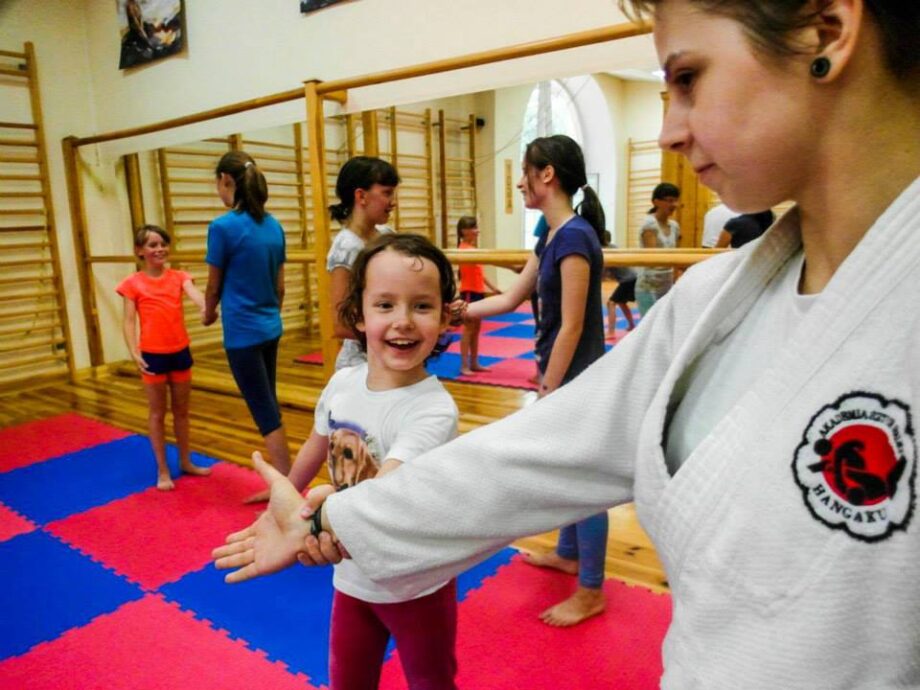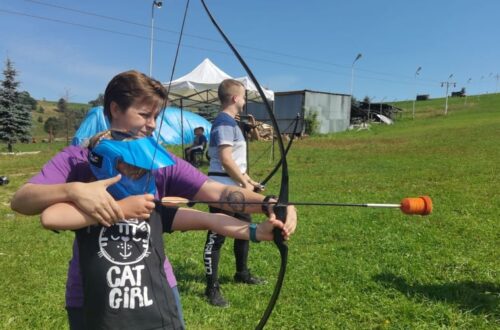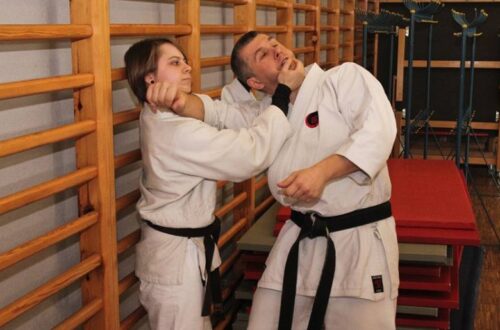
Gdy jeden naucza, uczy się dwóch|When one teaches, two are studying
Jest coś co mnie bardzo irytuje i sprawia, że tracę wiarę w ludzi:
Źli nauczyciele.
Nie cierpię ich. I nie mogę zdzierżyć gdy obserwuję.
Nie ma dla mnie znaczenia czy uczy wychowania fizycznego, matematyki, japońskiego, judo czy karate.
Jak zostać dobrym nauczycielem?
Jak stać się kimś, kto nie tylko uczy, ale także inspiruje, sprawia, że ludzie są szczęśliwi i że przekazywanie wiedzy jest przyjemne?
Są dwie zasady, (nazwij je złotymi, jeśli chcesz) które w tym pomogą. Obserwuję od lat najlepszych nauczycieli. I staram się od nich uczyć.
Nie musisz nawet być sensei,, aby przestrzegać tych dwóch zasad. Możesz (i powinieneś!) przestrzegać ich na przykład gdy pomagasz komuś na lekcji, uczysz matmy lub po prostu próbujesz zaszczepić jakąś wiedzę u przyjaciela.
Sam dawaj przykład
Dobry instruktor/trener/nauczyciel zawsze pokazuje wszystko samemu. Ponieważ dobry instruktor nie ma nic do ukrycia. Z radością pokazuje tę technikę raz za razem. A potem jeszcze raz. Nigdy nie stoi z założonymi rękami.
Dobry trener uwielbia szkolenia i nigdy nie zmarnuje okazji do treningu. Dlatego robi wszystko sam. Wielki nauczyciel po prostu za bardzo uwielbia trenować, by stać spokojnie i się przyglądać.
Co idzie za tym pierwszym punktem?
Technika trenera poprawia się: ponieważ ćwiczy na każdym treningu. Zamiast po prostu stać w miejscu, stopniowo się poprawia.
To nic odkrywczego. Żadnej Ameryki.
Kiedy jesteś instruktorem nie możesz wykonywać technik niechlujnie. Musisz dawać dobry przykład.
Uczniowie dzięki temu widzą, jak należy to zrobić: zamiast po prostu zgadywać z wyjaśnień instruktorów, widzą, jak robi to ktoś z doświadczeniem.
Gdy jeden naucza, uczy się dwóch.
Dodatkowo uczniowie czują się bliżej nauczyciela, zamiast czuć się „pod” cokołem, na którym wg nich stoi, i rozwijają lepszą więź. Cała atmosfera w dojo się zmienia.
Co jeszcze? Treść szkolenia pozostaje praktyczna: jeśli nauczyciel robi wszystko sam, nie może wybrać technik, które nie działają lub są złe (lub po prostu dziwne).
Widziałam wielu magików na salach treningowych. Nie zrobili na mnie dobrego wrażenia. Zdecydowanie jestem całym sercem za trenerami, którzy uczą konkretnych, sprawdzonych technik.
Daj wszystkim przynajmniej jeden pozytywny, konstruktywny komentarz.
To jest ta druga zasada. Być może nieco trudniejsza niż pierwsza, ale nadal prosta. Daj każdemu uczniowi choć jeden pozytywny, konstruktywny komentarz.
Ponieważ, wierz mi lub nie, większość ludzi nie chodzi na treningi, aby zostać arcymistrzami. Nie potrzebują usłyszeć jak należy ćwiczyć by zdobyć złoty medal. Nie muszą w tej chwili dowiedzieć się, że ich technika nie zabije 10 przeciwników na raz.
Trenują, ponieważ chcą odpocząć od swojej pracy czy szkoły, chcą spotkać innych ludzi, trochę się spocić, nauczyć się samoobrony, a przede wszystkim miło spędzić czas.
Przychodzą do klubu, ponieważ chcą. Nikt ich nie zmusza. Dlatego powinni zawsze czuć, że odchodzą z czymś nowym. Powinni czuć się nieco mądrzejsi, silniejsi i lepsi niż wtedy, gdy przyszli.
Zawsze.
Uczniowie powinni stale odczuwać, że się poprawiają. I robią to, gdy dajesz im pozytywny, konstruktywny komentarz.
Kwestia psychologii.
Kiedy otrzymujesz dobrą, konstruktywną uwagę, poprawisz się i poczujesz lepiej. A kiedy czujesz się dobrze, czynisz dobrze. Może to zabrzmi nieco naiwnie, ale dobro się rozprzestrzenia. Instruktor również staje się lepszy ponieważ stale poszukuje punktów do poprawy u swoich uczniów. Niezmiennie poprawia swoją technikę i wiedzę.
Kiedy jeden naucza, dwóch się uczy.
_______________________________
There is something that irritates me a lot and makes me lose faith in people:
Bad teachers.
I hate them. And I can’t bear it when I watch.
It doesn’t matter to me if it teaches physical education, maths, Japanese, judo or karate.
How to become a good teacher?
How to become someone who not only teaches but also inspires, makes people happy and makes imparting knowledge enjoyable?
There are two rules (call them golden if you want) that will help with this. I’ve been watching the best teachers for years. And I try to learn from them.
You don’t even have to be a sensei to obey these two rules. You can (and should!) Follow them, for example when helping someone in a class, teaching math, or just trying to instill some knowledge in a friend.
Set an example yourself
A good instructor / trainer / teacher always shows everything for himself. Because a good instructor has nothing to hide. She happily shows this technique again and again. And then again. He never stands with his arms folded.
A good trainer loves training and will never miss a training opportunity. That’s why he does everything himself. A great teacher just loves training too much to stand still and watch.
What follows this first point?
The trainer’s technique improves: because he exercises every workout. Instead of just standing still, it gradually improves.
This is nothing new. No America.
When you are an instructor, you must not do the techniques sloppily. You have to set a good example.
This way, students see how it should be done: instead of just guessing from the instructors’ explanations, they see someone with experience doing it.
When one teaches, two are studying.
Additionally, students feel closer to the teacher, rather than feel „under” the pedestal they believe to be standing on, and develop a better bond. The whole atmosphere in the dojo is changing.
What else? The content of the training remains practical: if the teacher does everything on his own, he cannot choose techniques that do not work or are wrong (or just weird).
I’ve seen many magicians in training rooms. They didn’t make a good impression on me. I definitely am wholeheartedly behind trainers who teach specific, proven techniques.
Give everyone at least one positive, constructive comment.
This is the second rule. Perhaps a bit more difficult than the first, but still simple. Give each student at least one positive, constructive comment.
Because, believe it or not, most people don’t train to become grandmasters. They don’t need to hear how to practice to win the gold medal. They don’t need to know right now that their technique won’t kill 10 enemies at once.
They train because they want a break from their work or school, they want to meet other people, sweat a little, learn self-defense, and most of all have a good time.
They come to the club because they want to. Nobody is forcing them. Therefore, they should always feel that they are going away with something new. They should feel a bit smarter, stronger and better than when they came.
Always.
Students should constantly feel that they are improving. And they do so when you give them a positive, constructive comment.
The question of psychology.
When you get good, constructive attention, you will improve and feel better. And when you feel good, you do good. It may sound a bit naive, but the good spreads. The instructor also gets better because he is constantly looking for points to improve with his students. Invariably improves his technique and knowledge.
When one teaches, two are studying





